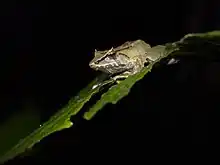| Pristimantis silverstonei | |
|---|---|
 | |
| Scientific classification | |
| Domain: | Eukaryota |
| Kingdom: | Animalia |
| Phylum: | Chordata |
| Class: | Amphibia |
| Order: | Anura |
| Family: | Strabomantidae |
| Genus: | Pristimantis |
| Species: | P. silverstonei |
| Binomial name | |
| Pristimantis silverstonei (Lynch and Ruíz-Carranza, 1996) | |
| Synonyms[2] | |
| |
Pristimantis silverstonei, also known as Silverstone's Robber Frog, is a species of frog in the family Strabomantidae. It is endemic to the Pacific slope of the Cordillera Occidental in the Valle del Cauca and Chocó Departments, Colombia.[1][2][3] The specific name silverstonei honors Philip Arthur Silverstone-Sopkin, an American botanist and herpetologist.[4]
Habitat and conservation
Pristimantis silverstonei is a nocturnal frog found on medium to high level vegetation in primary cloud forest at elevations of 1,700–2,250 m (5,580–7,380 ft) above sea level. Development is direct[1] (i.e., there is no free-living larval stage[5]).
A formerly common species, Pristimantis silverstonei has undergone a decline that took place in the mid–late 1990s and is possibly caused by chytridiomycosis. There are some indications that the populations might be recovering. Nevertheless, also habitat loss remains a threat. It occurs in two protected areas: Cerro El Inglés Natural Reserve and Tatamá National Natural Park. Its range is also close to the Farallones de Cali National Natural Park.[1]
References
- 1 2 3 4 IUCN SSC Amphibian Specialist Group (2019). "Pristimantis silverstonei". IUCN Red List of Threatened Species. 2019: e.T56963A85884818. doi:10.2305/IUCN.UK.2019-1.RLTS.T56963A85884818.en. Retrieved 17 November 2021.
- 1 2 Frost, Darrel R. (2022). "Pristimantis silverstonei (Lynch and Ruiz-Carranza, 1996)". Amphibian Species of the World: An Online Reference. Version 6.1. American Museum of Natural History. doi:10.5531/db.vz.0001. Retrieved 1 November 2022.
- ↑ Acosta Galvis, A. R. (2021). "Pristimantis silverstonei (Lynch & Ruiz-Carranza, 1996)". Lista de los Anfibios de Colombia: Referencia en linea V.11.2021. Retrieved 10 December 2021.
- ↑ Beolens, Bo; Watkins, Michael & Grayson, Michael (2013). The Eponym Dictionary of Amphibians. Pelagic Publishing. p. 198. ISBN 978-1-907807-42-8.
- ↑ Vitt, Laurie J. & Caldwell, Janalee P. (2014). Herpetology: An Introductory Biology of Amphibians and Reptiles (4th ed.). Academic Press. p. 166.
